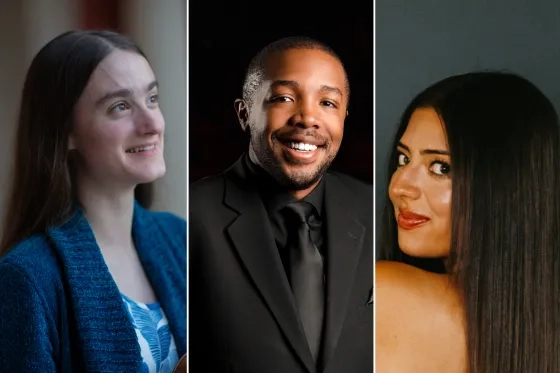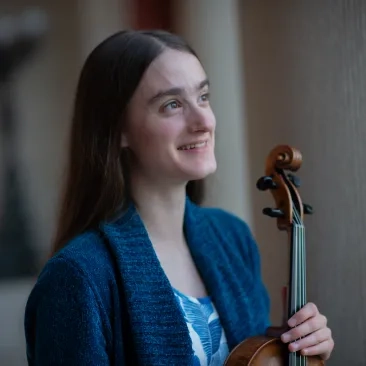Concerto Competition Winners Concert Highlights Young Talent from Both Sides of the Bay
On October 3, Competition winners Zoe Yost (viola) and Cristina Villalobos (soprano) will be performing Béla Bartók's Viola Concerto and Hector Berlioz's 'Les nuits d'été,' respectively.
Each year, SFCM's internal Concerto Competition offers students a chance to perform a spotlight performance with the SFCM Orchestra—and this year, some equally exciting young talent from across the Bay will be overseeing things.
Oakland Symphony Music Director Kedrick Armstrong will be on the podium for the evening, conducting the SFCM Orchestra first in Samuel Coleridge-Taylor's The Bamboula, before competition winners soprano Cristina Villalobos (soprano) and Zoe Yost (viola) take the stage for Hector Berlioz’s Les nuits d'ete and Bela Bartók’s Viola Concerto.
In the case of Villalobos—performing her first-ever concerto—the Berlioz was challenging for two reasons. "I'm a soprano and it is a bit lower, kind of more middle voice," she says. "And sometimes it'll be in the upper middle but then drop really low, so I really have to make sure I'm keeping my resonance and incorporating my chest voice."
The suite is also a markedly sad one, written at a difficult time in Berlioz's life, and its mournful quality meant that Villalobos was keen to keep it from falling into dirge territory. "The fifth movement is very slow, and I've heard people sing it in around eight minutes," she says. "I sing it in closer to five."
The work came at a difficult time in Berlioz's personal life, as his first marriage was failing. Villalobos was initially concerned about singing a piece she felt she couldn't quite relate to, but she says her studio teacher, César Ulloa, told her, "You're not dying. You're not 60, so don't try to sing like you are. Keep the energy alive, use the text to tell the story."
Armstrong's association with SFCM began via the Emerging Black Composers Project when he conducted the premiere of Shawn Okpebholo's Two Black Churches, one of the earliest commissions awarded. (Funnily enough, Okpebholo was Armstrong's aural skills professor when he was an undergraduate.) Armstrong gave a lecture at SFCM last year and participated in the Conservatory's Brass Day, and he says he was "thrilled and excited" to be invited to conduct this performance.
Armstrong conducted the Coleridge-Taylor piece as a postgraduate, but the Berlioz and Bartók are new pieces for him as a conductor. "I'm a very structural person," he explains of his preparation. "I like to know how all the phrases of the piece are put together, and then from there it gets whittled down. But with these two concertos, there's this element of the soloists and their interpretations, what they'll bring to the piece, so a conductor has to leave space in their interpretation for the other people's input and musicality."
Meanwhile, Bartók’s viola concerto, commissioned at the end of his life, was never even finished, which Armstrong says means that there's a wider variation of orchestrations and performances for it than other comparable works. (In a strange coincidence, at least one Berlioz biography suggests the composer never heard the orchestrated Les nuits d'été performed in its entirety, either.)
"I'm listening from both sides of the podium when I'm preparing," Armstrong continues. "I might find one recording with a conductor whose interpretation and another with a soloist's. So you get a sense of how to be flexible listening to different interpretations, especially doing the piece for the first time to really be prepared for anything that a soloist might do."
Armstrong acknowledges that at 31, he's on the younger side of the typical age range for a music director. "I don't take it for granted, but it wasn't by following one particular person's example. So my advice is to look at individuals as models but not blueprints. It's easy to think, 'Oh, I just need to make the same moves that they made and maybe I'll get there,' but I think it's more about taking the values and inspiration from those people, rather than their exact actions. I looked at all of these people who inspired me and realized that none of them followed a model at all. You can look at someone's path, but you can't be them."
Reserve tickets for the Oct. 3 performance here, and learn more about studying Voice, Opera, Viola, and Conducting at SFCM.


